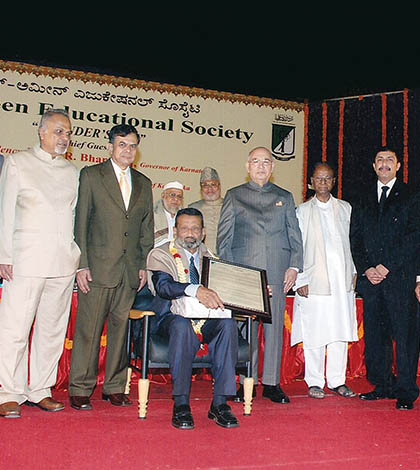
 Established in 1966 in Bangalore with a view to provide quality education for members of the Muslim community, the Al-Ameen Educational Society today provides education to about 70,000 students across India, writes Subhan Shariff
Established in 1966 in Bangalore with a view to provide quality education for members of the Muslim community, the Al-Ameen Educational Society today provides education to about 70,000 students across India, writes Subhan Shariff
The Al-Ameen Educational Society was established in 1966 in the city of Bangalore to provide for educational facilities to the minorities, especially members of the Muslim community. With a specific focus on education, banking and health sectors for the benefit of the downtrodden sections, especially members of the Muslim community, the founder Dr Mumtaz Ahmed Khan also laid the foundation of a big movement called “Al-Ameen Movement”.
Before the institution came into being, there was no centre of higher education for Muslims in Karnataka. Together with eight institutions of higher education in Bangalore along with 20 branches running primary, high school, pre-university courses and colleges in Kerala, Maharashtra, Bengal, Assam, Punjab, Rajasthan, U.P and Orissa with a total of 380 institutions under its ambit.
The founder Dr. Mumtaz Ahmed Khan, an educationist and social worker, devoted a majority of his life to promote education among minorities, especially among the Muslims of Karnataka. In recognition of his services in the field of education for the past 48 years and for bringing about an educational revolution among the minorities, the alumni of the society conferred upon him the title of ‘Baba-E-Taleem’.
The journey of the society through these years, though, has not been easy. In general, minority educational institutions were prone to financial challenges in the initial years and many courses are still unaided with insufficient infrastructure. In our case, the first challenge was lack of educational awareness in the community. This was coupled with the lack of dedicated and devoted social workers. However, with the inception of Al-Ameen Educational Society, these issues have largely been addressed and today, quality education is delivered. Today, Al-Ameen stands tall as among the premier educational institutes in India with an illustrious background of 40 years in the field of education.
What makes Al-Ameen unique
- Experienced qualified faculty
- Well-equipped libraries
- Air-conditioned seminar halls
- State-of-the-artlaboratories
- Internet facilities round the clock
- Well-organised placement cell
- Industrial visits on a regular basis
Student intake over the years has improved and there are 5,000 students in the city campus and 70,000 all over India with the break up of girls and boys in the ratio of 1:1.5. In a special scheme offered by us for women students, scholarships are provided from the management, NGOs and other agencies apart from minority commission facilities.
As far as attracting talent goes, attempts have been made to keep merit as the benchmark. However, seats are not denied to those who seek higher education. Many of our students who completed their MBA, MCA, M.Pharma, M.Sc, M.Com and B.Ed degrees are today well-placed in both corporate and public sectors. The frequency of interface and interaction with industry is also well established by the management college.
Our students, graduation and higher, are exposed to campus recruitments of both corporate and public enterprises as an annual affair. This is something that the management takes very seriously and has recruited a full-time qualified placement officer on campus. In an attempt to keep students abreast with the latest technology trends, ICT has been made a mandatory part of the curriculum in all courses at all institutions. The National Skill Development Corporation is actively involved with out institution for placements in the corporate and government sectors. To promote education and prevent students from droppingout, parents are also given counselling and students are provided Al-Ameen Scholarships to pursue studies.
“In an attempt to keep students abreast with the latest technology trends, ICT has been made a mandatory part of the curriculum in all courses at all institutions”
It has also been the management’s constant endeavour to procure maxi- mum educational benefits for the stu- dents and the community, regardless of which government is in power. However, there are a few issues that need to be ur- gently looked into. Minority certificates should be issued only by the state gov- ernment on organisational level and not institution-wise, which as a process has become very cumbersome. There are no avenues for the institution of research fellowship in individual institutions by the Central Minority Commission. We also feel that exchange programmes at the international level, publication of papers by Muslim research scholars and establishment of centres of higher education with one centre in each state should be encouraged. An academic staff college on the UGC pattern should also be set up in Bangalore for Muslim teachers and PG students to get refresher courses and orientation programmes. The government can also look into set- ting up of a branch of the Central Minority Commission in Bangalore as a zonal headquarter for south Indian states to enable management of minorities for speedy disposal of grievances.



















